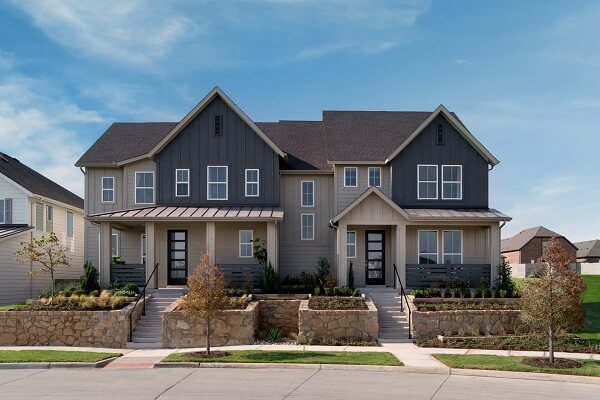
What is a linked property? Here’s a simple answer crafted for you: A residential property that does not have a shared wall with its neighbor is known as a linked house. They share a common wall, either through the garages or in the basements, despite their apparent separation. Usually, the two walls of the next houses have a little, useless space between them, which is a linked property.
Nowadays, this kind of building is a linked property in Ontario, less common because the cost savings from sharing the basement and foundation are not as great as the additional cost that developers may demand for fully independent homes. Such properties have been described as detached by estate agents.
Table of Contents
The purpose of building linked homes is to circumvent restrictions stating that the breadth of an independent house’s foundation must adhere to particular dimensions. A connected foundation or basement allows the developer to build multiple homes in a given space.
These days, it is rare to find this kind of building because the cost reductions from sharing the basement and foundations are not worth the additional cost.
A detached house with links might be very mysterious. The house isn’t attached or detached. It costs less than a detached home but more than a semi-detached one. It combines the benefits of a semi-detached home with the drawbacks of a detached one. How could that be true?
When a House is Linked, is it Detached or Semi-Detached?
A linked detached home is one that is connected to its neighboring property even if it does not share any walls with them. It can be connected by a garage or, as mentioned above, through the basement or foundations. It is inaccurate to refer to this kind of property as detached because it is connected to another home.
Furthermore, it would be inaccurate to refer to it as a semi-detached house because it shares no walls with the adjacent property.
Since the only features that connect a detached property to its neighbor is the garage or basement, it initially seems to be a detached property. On the other hand, it has an attached basement, which comes with certain unavoidable drawbacks.
A Prospective Study:
- What are the disadvantages of linked property?
- What are the problems with linked detached houses?
But before that, let’s first learn about the advantages of a linked property and then one can easily get the grip on what are the disadvantages of linked property.
What Distinguishes an Attached Home from a Detached One?

A detached home won’t have any shared walls and will be built on a plot of land for which they are alone responsible for maintenance. Shared walls can be seen on one or both sides of an attached home. An attached home may also consist of a single property that has been divided into two or more homes, all of which share the same land and structure and, thus, maintenance duties.
A house that has attachments on one side is referred to as semi-detached or end of terrace. A house is referred to as terraced if it is attached on both sides. Comparing detached homes to attached homes, detached homes may offer greater privacy and floor area.
It is clear from these definitions why a linked detached house does not fit into either group. And the reasons it would make a suitable “stepping stone” from a semi-detached to a detached home.
Benefits of a Linked Home Compared to a Semi-Detached Home
Detached homes often command a higher price than semi-detached ones. Usually, this premium results in a 20–25% value gain over a comparable semi-detached house. Although a linked detached home won’t command as much of a premium as a semi-detached home, it will nevertheless command a lower premium.
The Disadvantages of a Linked Property
Unlike linked detached homes, which usually share a driveway big enough for two cars, detached homes have their own driveway. Conflicts between the homeowners over cars that stray onto their property are frequently the outcome of this.
Linked Property: A Good Idea OR A Bad One?
A decent compromise between a detached and semi-detached home is a linked home. It enables homeowners to experience some of the advantages of owning a detached house with the drawbacks of a semi-detached home, for those who cannot afford a detached.
What are the Problems with Linked Detached Houses?
Because linked-detached homes are frequently referred to as detached homes on property websites, it can occasionally be confusing to look for information on them. But keep in mind that, as I previously mentioned, there are some regions of the nation where the cost difference between a detached and link-detached home is not very great, making the detached home a superior choice in those circumstances.
Clearly linked-detached homes are a fantastic option for those who want a separate home but are unable to buy one. They could be more noisy from the neighbors and do not provide the same levels of seclusion as fully detached homes.
What are the Problems with Linked Detached Houses?
A linked detached home will produce more noise than a detached home, in one of the problems with the linked detached houses, but it will still be quieter than a semi-detached home. Some people who live in detached link homes might turn their garage—which serves as the connecting space between the two—into a living area or kitchen. This causes more noise to be produced on the other side of the “link” and increases the likelihood that it will be easily heard by the detached house on the other link.
When adding an extension to a detached house, one item to consider is the potential impact on the property’s value. While adding an extension to a house usually increases its value, doing so to a detached link house may actually reduce its value because it appears to put the two properties closer together.
Planning permit approval should be delayed until after you’ve determined how the extension would affect the value of your detached home, as this will obviously rely on the quality of the work and the location of the extension.
Since the garage typically connects a separate house, this may result in a shared driveway or a dispute over who owns which drive. Numerous problems can arise from a shared driveway.
Related Articles
- How Long Do You Have to Transfer Property After Death?
- When is HST Applicable on Property Sale in Ontario?
- What is a Real Property Report?

My name is Adnan Khan and I am a realtor specializing in Pre-construction condos and homes sales.
I also do assignments of condos. You can contact me at 416-897-4714
Designation: P.Eng
Education: McMaster University, Engineering Technology
Specialty: Residential Real Estate
Experience: 15+
Area Covered: Downtown Toronto and Neighboring Area
Languages Spoken: English, Urdu





Leave a Reply